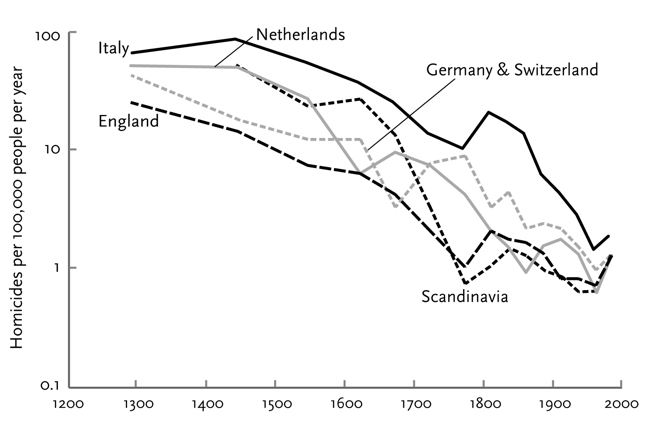And that's where it all kind of gets impossible. Our lives as we know of them are touched in every respect by systems that are concerned with the distribution of various resources. Specialization of labor is at the heart of every aspect of our civilization.
This kind of sweeping societal overhauls only maybe potentially becomes feasible if we reach a post scarcity point and, uhm, we're nowhere near that
I talked about a real life example of a densely packed city that was run this way. It's fine if people prefer other solutions, or don't approve of the way things were run during the Spanish Revolution. But all these ideas were tested and they functioned quite well. In fact, productivity in factories increased dramatically. My original post:
http://www.neogaf.com/forum/showpost.php?p=145146340&postcount=126
Well, it actually did in Spain back in 1936:
In Spain during almost three years, despite a civil war that took a million lives, despite the opposition of the political parties (republicans, left and right Catalan separatists, socialists, Communists, Basque and Valencian regionalists, petty bourgeoisie, etc.), this idea of libertarian communism was put into effect. Very quickly more than 60% of the land was collectively cultivated by the peasants themselves, without landlords, without bosses, and without instituting capitalist competition to spur production. In almost all the industries, factories, mills, workshops, transportation services, public services, and utilities, the rank and file workers, their revolutionary committees, and their syndicates reorganized and administered production, distribution, and public services without capitalists, high salaried managers, or the authority of the state....
They coordinated their efforts through free association in whole regions, created new wealth, increased production (especially in agriculture), built more schools, and bettered public services. They instituted not bourgeois formal democracy but genuine grass roots functional libertarian democracy, where each individual participated directly in the revolutionary reorganization of social life. They replaced the war between men, 'survival of the fittest,' by the universal practice of mutual aid, and replaced rivalry by the principle of solidarity....
This experience, in which about eight million people directly or indirectly participated, opened a new way of life to those who sought an alternative to anti-social capitalism on the one hand, and totalitarian state bogus socialism on the other.
George Orwell visited and wrote about it:
I had dropped more or less by chance into the only community of any size in Western Europe where political consciousness and disbelief in capitalism were more normal than their opposites. Up here in Aragon one was among tens of thousands of people, mainly though not entirely of working-class origin, all living at the same level and mingling on terms of equality. In theory it was perfect equality, and even in practice it was not far from it. There is a sense in which it would be true to say that one was experiencing a foretaste of Socialism, by which I mean that the prevailing mental atmosphere was that of Socialism. Many of the normal motives of civilized lifesnobbishness, money-grubbing, fear of the boss, etc.had simply ceased to exist. The ordinary class-division of society had disappeared to an extent that is almost unthinkable in the money-tainted air of England; there was no one there except the peasants and ourselves, and no one owned anyone else as his master.
...
Every shop and cafe had an inscription saying that it had been collectivized; even the bootblacks had been collectivized and their boxes painted red and black. Waiters and shop-walkers looked you in the face and treated you as an equal. Servile and even ceremonial forms of speech had temporarily disappeared. Nobody said 'Señor' or 'Don' or even 'Usted'; everyone called everyone else 'Comrade' or 'Thou', and said 'Salud!' instead of 'Buenos días'. Tipping had been forbidden by law since the time of Primo de Rivera; almost my first experience was receiving a lecture from a hotel manager for trying to tip a lift-boy. There were no private motor-cars, they had all been commandeered, and the trams and taxis and much of the other transport were painted red and black. The revolutionary posters were everywhere, flaming from the walls in clean reds and blues that made the few remaining advertisements look like daubs of mud. Down the Ramblas, the wide central artery of the town where crowds of people streamed constantly to and fro, the loud-speakers were bellowing revolutionary songs all day and far into the night. And it was the aspect of the crowds that was the queerest thing of all. In outward appearance it was a town in which the wealthy classes had practically ceased to exist. Except for a small number of women and foreigners there were no 'well-dressed' people at all. Practically everyone wore rough working-class clothes, or blue overalls or some variant of militia uniform. All this was queer and moving. There was much in this that I did not understand, in some ways I did not even like it, but I recognized it immediately as a state of affairs worth fighting for...so far as one could judge the people were contented and hopeful. There was no unemployment, and the price of living was still extremely low; you saw very few conspicuously destitute people, and no beggars except the gypsies. Above all, there was a belief in the revolution and the future, a feeling of having suddenly emerged into an era of equality and freedom. Human beings were trying to behave as human beings and not as cogs in the capitalist machine."
http://en.wikipedia.org/wiki/Spanish_Revolution


